|
|
|
Sort Order |
|
|
|
Items / Page
|
|
|
|
|
|
|
| Srl | Item |
| 1 |
ID:
050210


|
|
|
|
|
| Publication |
New York, Random House, 2002.
|
| Description |
xvii, 490p.
|
| Standard Number |
0375508597
|
|
|
|
|
|
|
|
|
|
|
|
Copies: C:1/I:0,R:0,Q:0
Circulation
| Accession# | Call# | Current Location | Status | Policy | Location |
| 046777 | 303.6250973/BEN 046777 | Main | On Shelf | General | |
|
|
|
|
| 2 |
ID:
082834
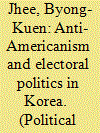

|
|
|
|
|
| Publication |
2008.
|
| Summary/Abstract |
Byong-Kuen Jhee analyzes Korean public attitudes toward the United States and whether and how voters' anti-American perceptions affect their electoral choices. He concludes that the surge of anti-Americanism in Korea may have a marginal impact on the country's existing favorable relationship with the United States.
|
|
|
|
|
|
|
|
|
|
|
|
|
|
|
|
| 3 |
ID:
082159
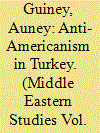

|
|
|
| 4 |
ID:
144319
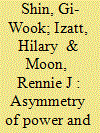

|
|
|
|
|
| Summary/Abstract |
While power asymmetry typically defines security relationships between allies, there exist other forms of asymmetry that influence alliance politics. In order to illustrate how they can shape policy outcomes that cannot be explained solely through the lens of power capabilities, the authors examine the role of relative attention that each side pays to the alliance. It is their central argument that since the client state has a greater vested interest in the alliance and given that attention depends on interest/need, the client state can leverage attention to get its way. By analysing two specific cases, the 2002 South Korean schoolgirls tragedy and the 2008 beef protests—instances where the South Koreans succeeded in compelling US concessions—the authors show that because the alliance was more central to the client state's agendas, there existed an asymmetry of attention that offered leveraging opportunities for the weaker ally. In this study, the authors emphasise the role of media attention as a key variable, and seek to contribute to debates on weaker party leverage in asymmetrical alliances.
|
|
|
|
|
|
|
|
|
|
|
|
|
|
|
|
| 5 |
ID:
066096
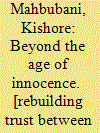

|
|
|
|
|
| Publication |
New York, Public Affairs, 2005.
|
| Description |
xx, 235p.
|
| Standard Number |
1586482688
|
|
|
|
|
|
|
|
|
|
|
|
Copies: C:1/I:0,R:0,Q:0
Circulation
| Accession# | Call# | Current Location | Status | Policy | Location |
| 050215 | 327.730090511/MAH 050215 | Main | On Shelf | General | |
|
|
|
|
| 6 |
ID:
090652
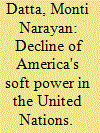

|
|
|
|
|
| Publication |
2009.
|
| Summary/Abstract |
To what extent does anti-Americanism precipitate a decline in America's soft power? Nye postulates a negative relationship, presenting substantial implications for the U.S. national interest. In this paper, I test Nye's hypothesis through an examination of America's political influence within the United Nations. Using a fixed effects model, I regress voting alignment within the UN General Assembly (UNGA) on cross-national, aggregate public opinion toward the United States from 1985 to 2007. Controlling for foreign aid received and alliances with the United States, I find a statistically significant, positive relationship between favorable attitudes toward the United States and voting alignment within the UNGA on overall plenary votes and those votes for which the U.S. lobbies other UN-member states extensively. At the same time, controlling for temporal effects, states are far less supportive of U.S. interests in the UN throughout the tenure of President George W. Bush, capturing the effect of "anti-Bushism" in addition to anti-Americanism. The results of this study shed light on an emerging area of the literature that not only studies the sources of anti-Americanism, but also its consequences.
|
|
|
|
|
|
|
|
|
|
|
|
|
|
|
|
| 7 |
ID:
161427
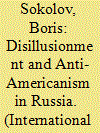

|
|
|
|
|
| Summary/Abstract |
In the early 1990s, the Russian public held overwhelmingly favorable attitudes toward the United States; in recent years, attitudes toward the United States have been overwhelmingly unfavorable. Analysts often trace this dramatic change to (1) the emergence of Russian-American conflicts such as those in former Yugoslavia and (2) Russian leaders’ attempts to escape blame for their country's failures by attributing them to a powerful external enemy. We point to another major factor of Russian anti-Americanism that preceded the international conflicts and the government-led anti-American propaganda: (3) disillusionment, or an emotional and ideological dissatisfaction with the outcome of pro-Western reforms that started among the liberal elites and then spread among the general public. Using data from the New Russian Barometer surveys, we analyze the dynamics of attitudes toward the United States from 1993 to 2009. We find that mass disappointment in the perestroika outcomes preceded the spread of anti-Americanism in Russia and that anti-American sentiment was stronger and occurred earlier among the elite than among the mass public. Furthermore, those (especially better-educated) people who express disappointment with the outcomes of pro-Western reforms prove significantly more anti-American. Our findings illustrate a general ideological phenomenon that may explain the growth of anti-Americanism in unsuccessful democracies worldwide.
|
|
|
|
|
|
|
|
|
|
|
|
|
|
|
|
| 8 |
ID:
168801
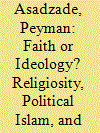

|
|
|
|
|
| Summary/Abstract |
The Middle East, particularly the Islamic Republic of Iran, has a reputation for harboring very strong forms of anti-Americanism. Why are some individuals more hostile to the United States than others? What factors are associated with anti-American sentiments? This article offers the first systematic study of anti-Americanism in Iran, a country in which anti-Americanism has been a guiding policy of the government since the 1979 revolution. Based on original survey data from 2016, I seek to explain how religiosity and political Islam influence public attitudes toward the United States. Distinguishing between political and cultural anti-Americanism, I find that, while support for political Islam is significantly associated with both types of anti-Americanism, religiosity predicts only cultural anti-Americanism. The findings challenge the literature that associates anti-American sentiments with religiosity in the Islamic world.
|
|
|
|
|
|
|
|
|
|
|
|
|
|
|
|
| 9 |
ID:
056177
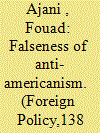

|
|
|
| 10 |
ID:
099119
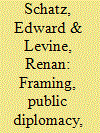

|
|
|
|
|
| Publication |
2010.
|
| Summary/Abstract |
The US State Department increasingly relies on efforts of public diplomacy to improve America's image abroad. We test the theoretical efficacy of these efforts through an experiment. Participants were recruited in Kyrgyzstan and Tajikistan. All but those participants randomly assigned to a control group read a quote about religious tolerance and pluralism in the United States. We varied the attribution of this quote to President Bush, to an unnamed US Ambassador, to an ordinary American, or to no one. We then asked respondents a battery of questions about their opinions of the United States before and after a long discussion with other participants about the United States. We find that the identity of the messenger matters, as those who read the quote attributed to Bush tended to have lower opinions of the United States. After the discussion, these views partially dissipated. Post-discussion views were more heavily influenced by how other participants viewed the United States. After controlling for the source and location of the discussion, when the discussion took place among people with more positive initial views of the United States, views of the United States improved. However, when there was a large range of views in the discussion, post-discussion views of the United States were relatively worse. Based on this study, we suggest new directions for the conduct of public diplomacy.
|
|
|
|
|
|
|
|
|
|
|
|
|
|
|
|
| 11 |
ID:
023558
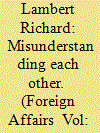

|
|
|
|
|
| Publication |
March-April 2003.
|
| Description |
62-74
|
|
|
|
|
|
|
|
|
|
|
|
|
|
|
|
| 12 |
ID:
109554
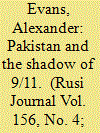

|
|
|
| 13 |
ID:
146873
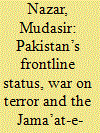

|
|
|
|
|
| Summary/Abstract |
How Islamic parties in South Asia respond to the global ‘War on Terror’ (WOT) and politicise related issues remains largely covered in press reports, which are often not in English. This article seeks to analyse the responses of one influential Pakistani Islamic party, Jama’at-e-Islami (JI), as a leading voice of protest. It provides evidence that engagement with WOT has reactivated JI and has become a political commodity for Islamists in Pakistan, feeding hopes that they will play a larger role in future governments in Pakistan. However, there are also signs that such hopes will remain unrealistic if JI does not distance itself from extremism and curbs Islamists’ terrorist activities.
|
|
|
|
|
|
|
|
|
|
|
|
|
|
|
|
| 14 |
ID:
073050
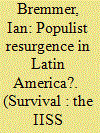

|
|
|
|
|
| Publication |
2006.
|
| Summary/Abstract |
Latin American voters will soon cast ballots in national elections in several countries. Some argue that the region is undergoing a uniform political shift to the left, that mistrust of neo-liberal economics and US foreign policy has united these states in a populist wave of reaction against both, and that this trend will bind these states to countries outside the region, undermining US interests. This generalisation does not withstand country-specific scrutiny. Analysis of the unique political circumstances in each of these states reveals that the populist, anti-American trend is hardly uniform, and that the political and economic ties that bind Latin America and the United States are not so easily undone.
|
|
|
|
|
|
|
|
|
|
|
|
|
|
|
|
| 15 |
ID:
146345
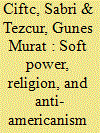

|
|
|
|
|
| Summary/Abstract |
This study presents the first systematic analysis of the public opinion dimension of soft power competition in the contemporary Middle East. Building on the scholarship on perceptions of foreign states and Arab public opinion, it proposes a series of hypotheses about sectarian identity, religious worldviews, and anti-Americanism as determinants of attitudes toward Turkey, Iran, and Saudi Arabia in the context of regional rivalry. It then presents multivariate probit estimations utilizing Pew Global Attitudes Survey to test these hypotheses. The findings suggest that religious identity and worldviews directly affect favorability ratings of these three powers in the Arab Middle East. While Sunnis favor Saudi Arabia and Turkey over Iran, religious individuals demanding Islamic law favor the Islamic Republic. Furthermore, anti-Americanism translates into lower support for Saudi Arabia and Turkey, but greater support for Iran. Democratic attitudes have no influence over perceptions of these three powers indicating the limits of democracy promotion as a foreign policy tool.
|
|
|
|
|
|
|
|
|
|
|
|
|
|
|
|
| 16 |
ID:
071610
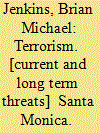

|
|
|
|
|
| Publication |
Santa Monica, Rand Corporation, 2001.
|
| Description |
10p.
|
| Series |
Testimony CT-187
|
|
|
|
|
|
|
|
|
|
|
|
Copies: C:1/I:0,R:0,Q:0
Circulation
| Accession# | Call# | Current Location | Status | Policy | Location |
| 045200 | 303.6250973/JEN 045200 | Main | On Shelf | General | |
|
|
|
|
| 17 |
ID:
156661
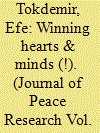

|
|
|
|
|
| Summary/Abstract |
Foreign aid is a policy tool implemented with the purpose of fostering both hard and soft power abroad. Yet, previous research has not probed the effects of US foreign aid on public attitudes toward the US in the recipient countries. In this article, I argue that US foreign aid may actually feed anti-Americanism: aid indirectly creates winners and losers in the recipient countries, such that politically discontented people may blame the US for the survival of the prevailing regime. Drawing on Pew Research for Global Attitudes and on USAID Greenbook datasets, I focus on determining both the conditions under which foreign aid exacerbates anti-Americanism and the type of aid most likely to do this. The findings reveal that political losers of the recipient countries are more likely to express negative attitudes toward the USA as the amount of US aid increases, whereas political winners enjoy the results of US aid and view the USA positively accordingly. Moreover, the effect of US aid on attitudes toward the USA is also conditional on the regime type. While US aid increases the likelihood of anti-American attitudes among the losers in non-democratic countries, it decreases the likelihood of anti-Americanism among the losers in democratic ones. This article has important implications for policy in terms of determining how and to whom to provide aid in the context of the possible ramifications of providing aid at the individual level.
|
|
|
|
|
|
|
|
|
|
|
|
|
|
|
|
| 18 |
ID:
090600
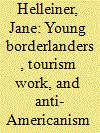

|
|
|
|
|
| Publication |
2009.
|
| Summary/Abstract |
This article analyzes local engagements with tourism at the Canadian Niagara border. While regional elites promote cross-border tourism as part of a wider project of economic restructuring, interviews conducted with young Canadian borderlanders reveal critiques of tourism-related work and expressions of anti-Americanism. Young borderlanders' experiences and identities, I argue, have wider implications for regional and continental projects of integration and securitization in a changing North American political economy.
|
|
|
|
|
|
|
|
|
|
|
|
|
|
|
|
|
|
|
|
|